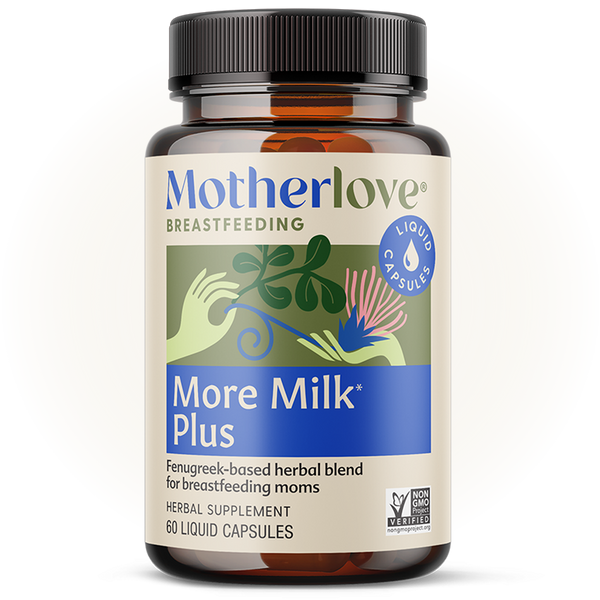Written by Wendy, IBCLC
Breast milk is full of healthy nutrients for your baby and comes in just the right amounts for their growing bodies. But it also provides something that no other baby food does: immunity. That’s right, breast milk is chock full of substances that protect your baby from viruses and infections. And the best part? These are available to your baby regardless of how much or how little you nurse, and whether or not you nurse directly at the breast or pump your milk.
Let’s take a closer look at immunity and breast milk.
HOW DOES BREAST MILK BOOST YOUR BABY'S IMMUNE SYSTEM?
Many components of breast milk work together to protect your baby from disease and build your baby’s immune system.
First of all, your breast milk contains antibodies that help protect your baby from getting sick in the first place. Breast milk also helps ensure that when your baby gets sick, they are able to fight the germs off more easily.
These antibodies are present from birth, but they also evolve over time. For example, if you are exposed to a virus, your breast milk immediately will start to produce antibodies against that virus so that your baby gets extra protection.
But it’s more than that, too. Here’s what to know:
- Breast milk contains certain fats, proteins, hormones, sugars, enzymes, and blood cells that work together to fight infection.
- Breast milk helps proliferate your baby’s intestines with germ-fighting elements to defend against disease.
- Breast milk delivers immune-response support components like interleukin-6, -8 and -10 and lactoferrin. These decrease inflammation in your baby’s body, which also supports a strong immune system.
- Breast milk contains probiotics (“good” bacteria”) that help support your baby’s gut and aids in a healthy immune response.
WHEN IT COMES TO IMMUNITY, EVERY DROP COUNTS
As wonderful as breast milk is, the truth is that not all of us can breastfeed our babies exclusively. Whether it’s a health challenge, a milk supply issue, a work schedule conflict, a non-latching baby, or anything else, many of us end up combo feeding our babies both breastmilk and formula. But here’s the thing: any amount of breast milk you feed your baby can help boost their immune system. For example, a 2003 study published by Archives of Pediatrics & Adolescent Medicine found that even just 50 mL of breast milk decreased the rate of sepsis in very low weight babies in the NICU. Other studies have found that while the more breast milk you are able to provide, the greater the immune benefits, any amount of breast milk is more protective than no breast milk at all in terms of protection against coughing, wheezing, ear infections, vomiting, and diarrhea.
Also, numerous studies and health organizations—like the World Health Organization and the Academy of American Pediatrics—have concluded that the immunological benefits of breastfeeding continue for as long as you do it, whether you are still exclusively breastfeeding, or feeding your baby solid foods.
WHAT TO DO IF YOUR BABY GETS SICK
Breastfeeding is a fantastic way to decrease the chances that your baby will get sick, but most babies will still get sick at one point or another. While breastfed babies usually get less severely ill than babies who aren’t fed any breast milk at all, that doesn’t mean they won’t need attention and care.
HERE ARE SOME TIPS FOR SICK DAY SUPPORT
- Keep breastfeeding. Nursing is a great way to ensure your baby is properly hydrated and nourished when they are having trouble eating and drinking. You can feed your baby breast milk even if they are vomiting or having diarrhea.
- Ask your pediatrician about a baby-friendly fever reducer. Follow your doctor’s instructions carefully, since dosing varies based on your baby’s age and weight.
- Consider using a humidifier. A humidifier can also help with stuffy noses and coughs.
- Consider saline drops, sprays, and rinses for clogged noses.
- Try a chest rub, like Motherlove’s organic Children's Chest Rub. While not intended to treat or cure illness, chest rubs can help soothe congestion with beneficial herbs.
Although these at-home remedies can work wonders, and most babies will get better in a few days, sometimes illnesses in babies are medical emergencies. Here are some signs that your baby’s sickness needs emergency attention:
- Your baby is having trouble staying awake and is extremely lethargic.
- Your baby is wheezing seriously and is gasping for breath.
Other scenarios may not be an emergency, but warrant a prompt call to your baby’s pediatrician. Call your baby’s doctor right away if:
- Your baby is vomiting non-stop for more than a few hours and has dark pee, a dry mouth, and no tears when they cry.
- Your baby over three months has a temperature over 104° F.
- Your baby under three months has a temperature over 100.4 ° F.
- Your baby has had a fever for more than five days.
- Your baby is having trouble breathing or is wheezing.
THE BOTTOM LINE
Breast milk has antibodies and other immunity components that help your baby fight germs. That means fewer days of sickness and less chance of germs making your baby very sick. And the good news is that these benefits are present whether you breastfeed exclusively or do some combo feeding of breast milk and formula. These benefits also last for as long as you nurse your little one, including when you start feeding them solid foods.
If you have any questions about breastfeeding and immunity, including any sickness your baby may have caught, you shouldn’t hesitate to reach out to your healthcare provider.
SOURCES
Academy of American Pediatrics. Breastfeeding Benefits Your Baby’s Immune System. 2023.
Academy of American Pediatrics. Caring for Kids with Colds & Flu: Simple Remedies to Ease Symptoms.2024.
Furman L, Taylor G, Minich N, Hack M. The effect of maternal milk on neonatal morbidity of very low-birth-weight infants. Arch Pediatr Adolesc Med. 2003 Jan;157(1):66-71. doi: 10.1001/archpedi.157.1.66. PMID: 12517197.
Lokossou GAG, Kouakanou L, Schumacher A, Zenclussen AC. Human Breast Milk: From Food to Active Immune Response With Disease Protection in Infants and Mothers. Front Immunol. 2022 Apr 5;13:849012. doi: 10.3389/fimmu.2022.849012. PMID: 35450064; PMCID: PMC9016618.
Meek JY, Noble L; Section on Breastfeeding. Policy Statement: Breastfeeding and the Use of Human Milk. Pediatrics. 2022 Jul 1;150(1):e2022057988. doi: 10.1542/peds.2022-057988. PMID: 35921640.
World Health Organization. Continued breastfeeding for healthy growth and development of children. 2017.







